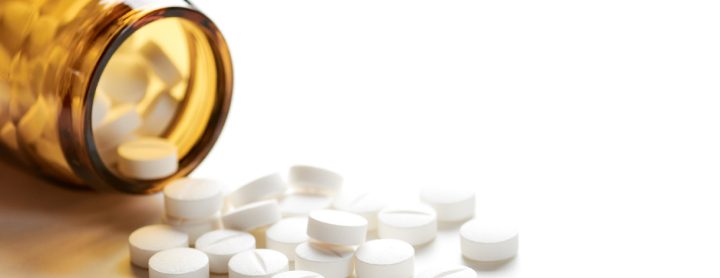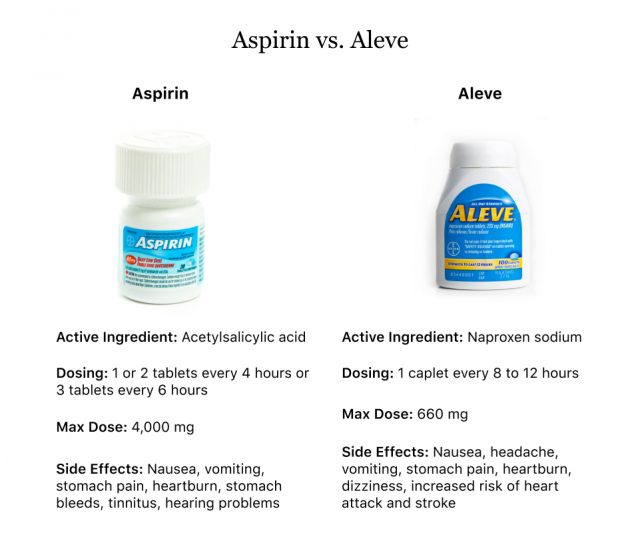Can You Take 81 Mg Aspirin and Aleve at the Same Time
Aspirin vs Aleve
Aspirin (acetylsalicylic acid) and Aleve (naproxen sodium) are nonsteroidal anti-inflammatory drugs (NSAIDs) that reduce pain, fever and inflammation. People who take had previous strokes or heart attacks may take aspirin in low doses to prevent some other. Aleve lasts longer than aspirin and may crave fewer doses for pain relief.

The agile ingredient in aspirin is acetylsalicylic acid. It'due south bachelor over-the-counter in brand names and generics. Aleve's active ingredient is naproxen sodium, and information technology's available over-the-counter in generic.
Aspirin and Aleve work in similar means to save pain. They inhibit an enzyme called cyclooxygenase (COX). COX has two forms, COX-i and COX-ii. COX-1 protects the stomach lining from digestive acids and enzyme damage. COX-ii causes swelling and pain. COX-1 narrows arteries and makes platelets in the bloodstream sticky. COX-2 widens arteries.
Older NSAIDs such every bit aspirin and naproxen inhibit COX-1 and COX-two. This eases swelling and pain simply causes an upset tummy and other gastrointestinal effects.
In general, most people tolerate aspirin and Aleve well. But both drugs increase the take a chance of stomach hurting and more than serious bug such as ulcers or haemorrhage.

Aggrandize
What Do They Treat?
In general aspirin and Aleve take similar uses such as relieving hurting and reducing fevers. Dissimilar Aleve, aspirin may preclude second center attacks and strokes. Some formulas of aspirin, such as Bayer Advanced Aspirin piece of work in as little as 16 minutes.
Because Aleve lasts longer, information technology may be a meliorate choice for people with chronic hurting. More than doctors prescribe non-aspirin NSAIDs such as Aleve for different types of arthritis. It lasts longer, only it takes longer to start working. So it'southward not a skillful choice for quick hurting relief.
Aspirin and Aleve uses include:
- Headache
- Menstrual pain
- Minor pain of arthritis
- Muscle hurting
- Pain and fever of colds
- Toothache
Heart Attack Prevention
Low-dose aspirin is the only NSAID used past medical professionals in the United states of america to help reduce the risk of another eye attack or stroke in people who have had previous eye attack or stroke. It thins the claret which helps prevent claret clots.
The American Heart Association warns confronting taking daily low-dose aspirin without a dr.'s recommendation considering of the risk for bleeding.
If you have aspirin for heart therapy, taking information technology with ibuprofen or some other NSAID may reduce the benefit.
Inflammatory Arthritis
Aspirin and Aleve are indicated for treating arthritis, but doctors are more probable to recommend a non-aspirin NSAID, such as Aleve, for arthritis and other inflammatory diseases.
Naproxen at higher doses may relieve pain from chronic weather such as rheumatoid arthritis, osteoarthritis, acute gout and ankylosing spondylitis — a type of inflammatory arthritis of the spine. It may help people living with chronic pain ameliorate manage long-term pain symptoms.
Some doctors may recommend if off label to treat migraines.
Dosage
Aspirin and Aleve come in different strengths and have different dosages. Each drug comes in unlike forms, such as extended release, liquids and suppositories. Because aspirin and Aleve tin cause stomach issues, they should be taken with food or a full glass of water.
Children and adults tin can take aspirin and Aleve, but children younger than 12 years one-time should not use Aleve.
Aspirin Dosages and Forms
Aspirin comes in strengths ranging from 60 mg to 800 mg. It comes in extended-release tablets, delayed-release tablets, a chewable tablet, a gum to accept by rima oris, a pulverization, and a suppository to apply rectally. College strengths are just available by prescription.
The most common doses are low-dose aspirin, regular strength aspirin and extra strength aspirin. Doctors may adjust the dose depending on the condition existence treated.
The maximum daily dose for aspirin is 4,000 mg.
Common Recommended Aspirin Dosages
| Low-dose 81 mg | Regular Force 325 mg | Actress Strength 500 mg | |
|---|---|---|---|
| Dose and Frequency | iv to eight tablets every 4 hours | 1 or 2 pills every 4 hours, or 3 pills every vi hours | 1 or 2 pills every iv to 6 hours |
| Daily Limit | Practice not have more than 48 tablets in 24 hours unless directed by a doctor | Do not have more than 12 pills in 24 hours | Do not take more than eight pills in 24 hours |
Aleve Dosages and Forms
Aleve over-the-counter comes in 220 mg. Only other naproxen brands are available past prescription and dosages can go as loftier as 750 mg.
Aleve OTC is bachelor in tablet, gelcap, caplet or liquid gel. Just other formulas are available in delayed release tablets, extended release tablets, capsules and oral suspension.
For Aleve OTC, take one 220 mg pill every 8 to 12 hours. For the first dose, patients can take ii pills within the offset hour. Don't take more than ii pills in 12 hours, and practise not take more than 3 pills in 24 hours.
Don't have Aleve for more than than 10 sequent days unless your doctor tells y'all to. The maximum daily dose for naproxen is 660 mg.
Side Furnishings
Aspirin and Aleve are NSAIDs and they have similar side effects. The most common side effects for both are gastrointestinal side effects such equally stomach pain, breadbasket haemorrhage and ulcers.
Because aspirin thins the blood, it is more likely to cause haemorrhage. People with any kind of blood or bleeding disorder should not take aspirin.
Aleve may increment the risk of aseptic meningitis – inflammation of the membrane covering the spinal cord and encephalon — specially in patients with lupus. Unlike aspirin, Aleve may cause drowsiness and blurred vision.
Fact
The FDA warns that not-aspirin NSAIDs such as Aleve may increase the chance of heart assail or stroke. Heart assail or stroke can occur every bit early every bit the showtime weeks of using the NSAID.
Aspirin Side Effects
Aspirin side outcome information doesn't include information on how mutual the side effects are.
Aspirin side furnishings include:
- Fundamental nervous system (CNS) changes
- Excess fluid in lungs (pulmonary edema)
- Hearing loss
- Kidney damage
- Liver toxicity
- Nausea
- Platelet bug
- Premature destruction of red claret cells
- Rash and skin problems
- Spasm of airways in the lungs (bronchospasm)
- Tum pain, ulceration and bleeding
- Swelling nether the skin from accumulated fluid (angioedema)
- Tinnitus, ringing in the ears
- Urticaria (hives)
- Vomiting
Warnings
Astringent allergic reactions to aspirin have happened, and people with a history of allergies to the drug, such every bit hives or breathing problems, should not use it. People with bleeding GI ulcers, anemia, hemophilia, hemorrhoids, nasal polyps associated with asthma or ulcerative colitis should non use the drug.
Like other NSAIDs, aspirin has the potential to trigger heart failure because information technology may pb to sodium and water memory. Long-term high-dose aspirin employ should be avoided, especially during pregnancy. High doses may cause nascence defects and prolong gestation and labor.
Aspirin enters chest milk. Lactating mothers should ask their medico's communication about whether they should finish breastfeeding or stop taking the drug.
Aleve Side Effects
Naproxen side effects gathered from drug labels include side effects that occur in 1 to x percent of people in OTC and prescription strength formulas.
Naproxen side effects include:
- Abdominal pain (3 to 9 percentage)
- Constipation (3 to nine percent)
- Diarrhea (1 to three pct)
- Diverticulitis (i to iii percentage)
- Dizziness (3 to ix percentage)
- Drowsiness (3 to 9 percent)
- Fluid retention (iii to 9 percent)
- Gastrointestinal bleeding (1 to 4 pct)
- Gastrointestinal perforation (1 to four percentage)
- Gastrointestinal ulcers (1 to iv per centum)
- Headache (3 to 9 percent)
- Hearing disturbances (less than 3 percent)
- Heartburn (3 to 9 percent)
- Inflammation of oral cavity and lips (stomatitis) (less than 3 percent)
- Lightheadedness (less than 3 percentage)
- Nausea (3 to 9 per centum)
- Shortness of breath (3 to nine percent)
- Swelling (iii to ix percent)
Warnings
People who are allergic to aspirin shouldn't take Aleve or any brand of naproxen. Aleve may cause serious skin reactions. Some tin can be life threatening. People should stop the drug at the showtime sign of a skin rash. Types of rashes include: exfoliative dermatitis, toxic epidermal syndrome, Stevens-Johnson syndrome and toxic epidermal necrolysis.
Taking naproxen may cause a person to develop high claret pressure. Like other NSAIDs, Aleve has the potential to trigger centre failure considering information technology may lead to sodium and water retention. The risk is higher if taken in higher doses than directed or for longer than directed.
There aren't plenty studies in pregnant women who accept Aleve. Only women who accept NSAIDs while significant may accept a greater take a chance of having a stillbirth. Pocket-sized amounts of naproxen have been detected in breast milk. Mothers should talk to their doctors if they are breastfeeding while taking Aleve.
Delight seek the advice of a medical professional person before making health care decisions.
Source: https://www.drugwatch.com/health/chronic-pain/aspirin-aleve/
0 Response to "Can You Take 81 Mg Aspirin and Aleve at the Same Time"
Post a Comment